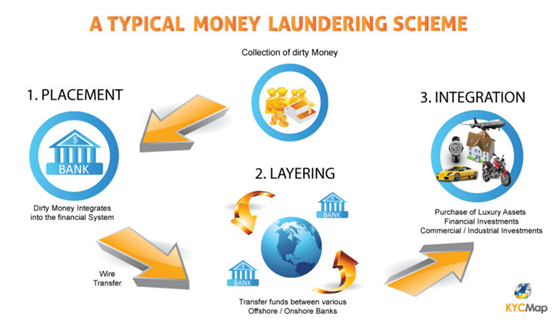What is Money Laundering?
Money laundering is the process by which proceeds of crime are transformed into ostensibly legitimate money or other assets. The term ‘money laundering’ has become conflated with forms of financial crime and is sometimes used more generally to include misuse of the financial system (involving digital currencies, credit cards and traditional currencies) including terrorist financing, tax evasion and evading international sanctions.
Money Laundering is commonly defined as happening in 3 steps:
- Placement – Introduction of cash into the financial system by some means;
- Layering – To undertake complex financial transactions to camouflage the illegal source;
- Integration – The acquisition of wealth generated from the transactions of the illicit funds.

Money laundering can take several forms
What is Terrorist Financing?
Terrorist Financing refers to the processing of funds to sponsor or facilitate terrorist activity. A terrorist group builds and maintains an infrastructure to facilitate the development of sources of funding for their own requirements and possibly to launder the funds used in terrorist activity.
Terrorist organisations derive income from a variety of sources, often combining both lawful and unlawful funding which can be grouped into two types:
- Financial Support – In the form of donations, community solicitation and other fund-raising initiatives. Financial support may come from States, from large organisations or from individuals.
- Revenue Generating Activities – Income from criminal activities such as kidnapping, extortion, smuggling or fraud. Income may also be derived from legitimate economic activities such as diamond trading or real estate investment.
Terrorist groups will want to disguise illegal funds while at the same time preserving the continuity of or maximising revenue from legitimate sources. The need to camouflage the sources of funds means that terrorist financing has certain similarities with traditional money laundering namely the use of the three steps i.e. to place, layer and integrate the funds in the international financial system.
One significant difference between traditional money laundering and terrorist financing is that:
- the investigation of financial transactions in traditional money laundering is done in order to link the funds to a criminal act that has already taken place and to strip the criminal and any accomplices from the economic benefits of engaging in criminal behaviour.
- in terrorist financing the investigation is done to prevent individuals gaining access to funds that could finance future criminal activity.
The offence of terrorist financing involves the provision, collection or receipt of funds with the intent or knowledge that the funds will be used to carry out an act of terrorism or any act intended to cause death or serious bodily injury. It also includes collecting or receiving funds intending that they be used or knowing that they will be used for the benefit of a terrorist group. The Criminal Justice (Terrorist Offences) Act 2005 gave effect to the 1999 United Nations Convention for the Suppression of the Financing of Terrorism. It created a new offence of financing terrorism and inserted a scheme through which An Garda Síochána can freeze and/or confiscate funds used or allocated for use in connection with an offence of financing terrorism or funds that are the proceeds of such an offence.
The Criminal Justice (Money Laundering and Terrorist Financing) Act 2010 as amended sets out the measures to be taken to prevent terrorist financing. Under Part 4 of the 2010 Act credit and financial institutions and Designated Non-Financial Businesses and Professions are obliged to take measures to prevent the financing of terrorism such as carrying out risk assessments, customer due diligence, ongoing monitoring, reporting of suspicious transactions, training and having in place effective policies and procedures.
Financial sanctions are political measures taken to restrict the movement of funds to achieve a specific outcome. Targeted Financial Sanctions are a specific type of financial sanction with a stated objective, one of which is the prevention of terrorist financing.


